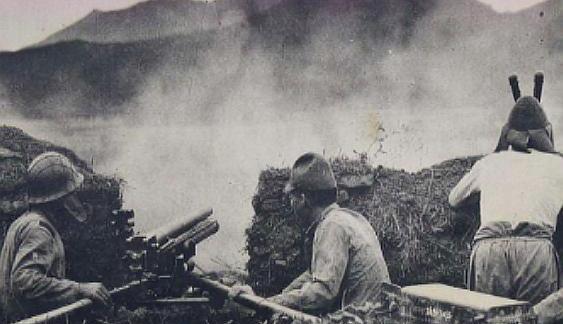At the end of July 1938, the Defense of Lushan began. The attacking party was the Taidaibao Regiment of the Japanese 101st Division, and the 3rd and 11th Regiments of the Jiangxi Security Force were responsible for the defense of Lushan. The combined strength of the two regiments was less than 3,000 people, not as much as the strength of a japanese company, and the security regiment was not a regular unit of the National Army, and the equipment was incomparable with that of the Japanese army. From this point of view, Lushan has no possibility of holding it at all.

On the morning of July 30, the Japanese army first used more than 10 field guns to bombard the Nationalist positions, and the dust flew. After the shelling, more than 200 Japanese troops climbed up the steep mountain road. More than 30 officers and men of the Second Brigade of the 3rd Security Regiment jumped out of the bunker and entered the position. When the Japanese were only 100 meters away from the position, they opened fire fiercely, and bullets and grenades rained down on the Japanese army. The well-trained Japanese troops immediately fell on the ground, the defenders immediately pushed down piles of boulders, the boulders roared down, the Japanese troops lying on the ground immediately exploded their nests, hiding in all directions, and the machine guns of the defenders immediately strafed fiercely, hitting the Japanese troops with their heads.
The Japanese then launched several more onslaughts, but were all repelled by the defenders using the terrain. A Japanese soldier who graduated from the Sendai Art College in Japan wrote in his diary that day: "Lushan is a place of fame in China, an unprecedented fierce battle, the death of the squadron leader is great, and the hope of family reunion is dangerous." In order to better stimulate the morale of the defenders, in late August, Chiang Ching-kuo took several guards to Lushan to inspect the officers and men, and the morale of the defenders was greatly boosted.
On August 30, the day before leaving Lushan, Chiang Ching-kuo gathered two regiments of officers and held a solemn flag-raising ceremony at Dayueshan. Amid the sound of military music, the national flag rises and flutters between the blue sky and white clouds. Chiang Ching-kuo, dressed in military uniform, stood under the military flag and solemnly said: "The national flag represents the sovereignty of the country, and wherever the national flag is, sovereignty is where it is." Now that the national flag is raised in Lushan, we will swear to defend her to the death and crush the enemy's attack on Lushan with flesh and blood! ”
Facing the national flag, all the officers and men burst into tears. General Yang Yuchun, commander-in-chief, raised his arm high and expressed his determination on behalf of the officers and men of the two regiments: "When we raise the flag at Lushan, we declare our determination: We are determined to defend this sacred area of Lushan with flesh and blood, and we will continue to complete our tasks even if we have every soldier and one pawn, one shot and one bullet left." Unable to attack Lushan for a long time, Okamura Ningji became angry and sent the Iizuka Wing to attack Mt. Higashiyama in a vain attempt to detour from here and encircle the Lushan defenders.
The wing commander of the Iizuka Wing, named Kunigoro Iizuka, was a senior student at the Japanese Army Non-Commissioned Officer School, and was known as the "Double Male" of the Japanese Army along with Norihide Abe. Norihide Abe is known as the "Flower of famous generals", and Kunigoro Iizuka is known as the "God of War". However, this "god of war" was met with stubborn resistance from the 160th Division of the Nationalist Army at Dongmu Mountain, and not only did the continuous attack fail for many days, but also suffered heavy losses. When Iizuka Kunigoro was depressed, the famous Japanese war correspondent Koto Yukio came to the front line to interview, after Koizuka Yukio had interviewed Iizuka Kunigoro many times and recorded many shots of his "heroic struggle". It is thanks to the hard work of Yukio Koshiro that Iizuka is called "God of War" by the Japanese.
Although the fierce battle between the two sides was raging, in order to cooperate with Komi Yukio's interview and to show his bravery, Iizuka Kunigoro brought Koto Yukio and others to the front of the position to pose. He drew his command knife, shouted, jumped up and down, performed very hard, and in order to highlight the effect, Koto Yukio also fastened a steel helmet to Iizuka Kunigoro, and the sun shone brightly. When Iizuka Kunigoro was performing hard, the Nationalist troops on the opposite position discovered this funny scene and immediately lit a fire according to the light, and Iizuka Kunigoro fell and was killed on the spot. After the news reached China, the whole country of Japan was saddened and regretted the loss of a "military god."